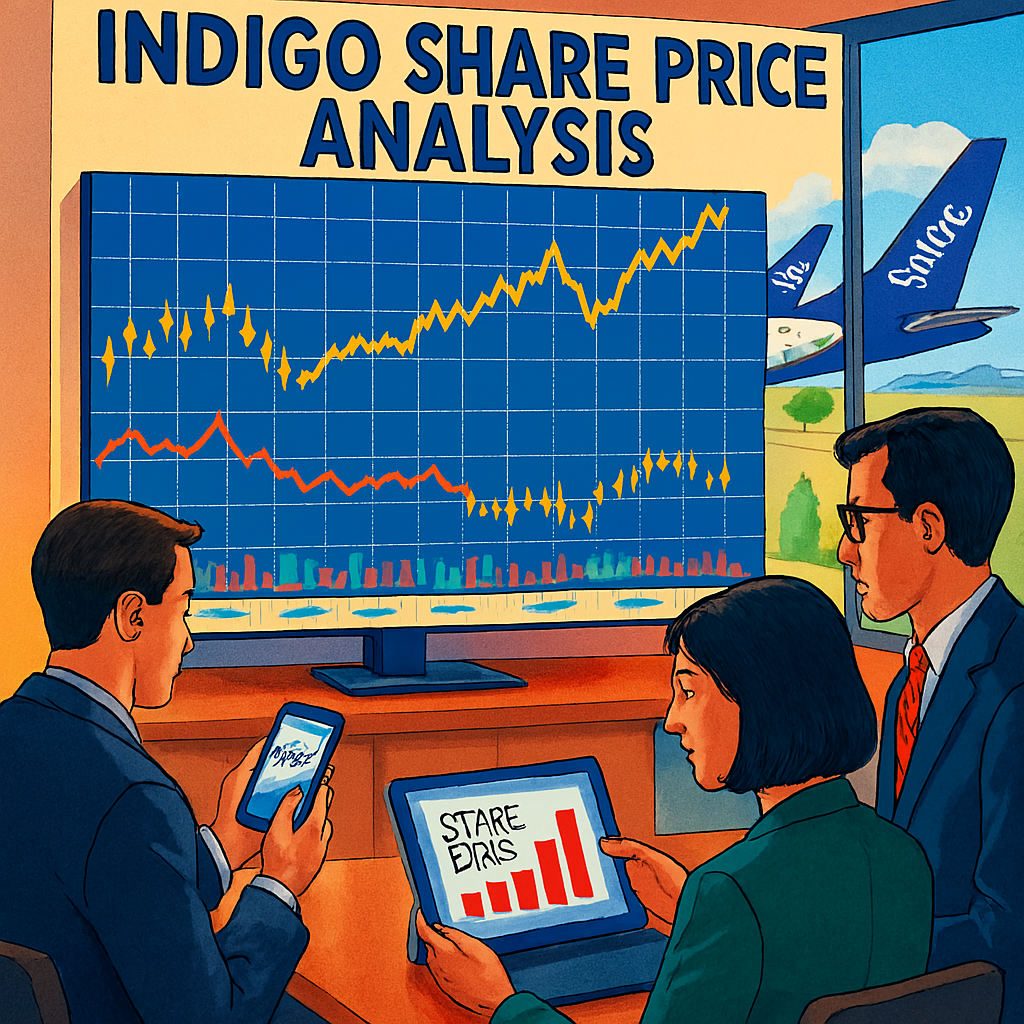
Indigo Share Price: Market Reactions and Investor Insights

Indigo share price has been in focus after reports of a major stake sale by the Rakesh Gangwal family. This blog explores the latest developments, market reactions, and what it means for investors.
Table of Contents
Introduction: Powerful Market Dynamics Driving Investor Excitement
The Indigo share price landscape has witnessed extraordinary developments that are captivating seasoned investors and market analysts across India’s dynamic financial ecosystem. With the Rakesh Gangwal family executing massive stake sales totaling over ₹30,000 crores across multiple transactions since 2023, InterGlobe Aviation’s stock has emerged as one of the most compelling investment narratives in the Indian aviation sector. Recent data reveals that Gangwal raised ₹11,564 crores ($1.4 billion) in May 2025 alone, selling 22.1 million shares at ₹5,232.5 each, marking one of India’s largest secondary market transactions.
The current trading scenario presents a fascinating paradox: despite substantial promoter exits, Indigo share price has demonstrated remarkable resilience, currently trading around ₹5,670 with a market capitalization exceeding ₹2,19,480 crores. This extraordinary performance underscores the stock’s fundamental strength and institutional confidence in India’s aviation giant.
Indigo’s Dominant Market Position: Unrivaled Leadership in Indian Aviation
InterGlobe Aviation, operating under the IndiGo brand, commands an unprecedented position in India’s aviation landscape. The company’s strategic excellence extends far beyond mere market share dominance, encompassing operational efficiency, fleet modernization, and route network expansion that competitors struggle to match.
Comprehensive Business Excellence Framework
Market Supremacy: IndiGo maintains its position as India’s largest domestic airline with over 60% market share, a testament to its superior operational model and customer-centric approach. As of March 31, 2025, the company operates a fleet of 434 aircraft, making it one of Asia’s most formidable aviation forces.
Financial Robustness: The airline’s financial architecture demonstrates exceptional resilience against industry headwinds. Despite facing challenges including volatile fuel prices, currency fluctuations, and pandemic-related disruptions, IndiGo has maintained healthy profit margins and consistent revenue growth trajectories that outperform industry averages.
Strategic Growth Initiatives: The company’s aggressive expansion into international markets, coupled with domestic route optimization, positions IndiGo for sustained long-term growth. Recent investments in next-generation aircraft, digital transformation initiatives, and sustainability programs reflect management’s forward-thinking approach.
Operational Excellence: IndiGo’s on-time performance, fleet utilization rates, and cost management metrics consistently rank among global aviation industry leaders, providing competitive moats that are difficult for rivals to replicate.
Detailed Analysis of Rakesh Gangwal’s Strategic Exit Pattern
The Gangwal family’s methodical divestment strategy represents one of the most significant promoter exit stories in Indian corporate history. Understanding this timeline provides crucial insights for current and prospective investors evaluating Indigo share price movements.
Comprehensive Stake Sale Timeline and Financial Impact
May 2025 – The Blockbuster Transaction: Gangwal and The Chinkerpoo Family Trust sold 22.1 million shares at ₹5,232.5 each, raising ₹11,564 crores. This transaction was significantly upsized from the initial 13.2 million shares due to overwhelming institutional demand, demonstrating robust investor appetite for IndiGo stock.
August 2024 – Major Institutional Interest: The family offloaded approximately 5.2% of their stake, raising ₹9,549 crores, with strong participation from domestic and international institutional investors.
March 2024 – Continued Methodical Exit: Another significant transaction further reduced the family’s holding, maintaining the gradual divestment approach that has characterized their exit strategy.
Historical Context – Earlier Divestments: In September 2022, Rakesh and Shobha Gangwal sold 2.74% for ₹2,005 crores, followed by Shobha Gangwal’s 4% stake sale in February 2023 for ₹2,944 crores.
Recent August 2025 Development: The latest block deal involves a 3.1% stake sale worth approximately ₹7,000 crores, with the transaction reducing their holding to 4.78%.
Strategic Implications of Promoter Exit
The systematic nature of these transactions suggests sophisticated portfolio diversification rather than concerns about IndiGo’s business prospects. The fact that each sale has been oversubscribed by institutional investors indicates strong confidence in the company’s fundamentals and growth trajectory.
Current Indigo Share Price Performance: Technical and Fundamental Analysis
IndiGo’s stock performance presents a compelling case study in how strong fundamentals can overcome temporary market pressures from large-scale stake sales.
Recent Price Action and Market Dynamics
Current Valuation Metrics: Trading around ₹5,670 with a 52-week high of ₹6,232.50 and low of ₹3,780.00, IndiGo stock demonstrates significant appreciation potential from its recent lows while maintaining reasonable valuation levels relative to its growth prospects.
Market Capitalization Strength: With a market cap exceeding ₹2,19,733 crores, IndiGo ranks among India’s most valuable companies and represents the largest aviation stock by market value in the Indian market.
Trading Patterns and Volume Analysis: Recent trading sessions have shown healthy volumes, indicating robust institutional and retail investor interest despite temporary volatility around stake sale announcements.
Sector Tailwinds Supporting Price Performance
Aviation Recovery Momentum: India’s domestic aviation sector has witnessed remarkable recovery post-pandemic, with passenger traffic reaching new highs and load factors improving consistently across quarters.
Fuel Price Stabilization: Relatively stable crude oil prices have provided relief to airline operating costs, directly benefiting bottom-line performance and supporting stock valuations.
Infrastructure Development: Government investments in airport infrastructure, regional connectivity schemes, and aviation policy reforms create a favorable operating environment for market leaders like IndiGo.
Financial Performance Deep Dive: Revenue Growth and Profitability Trends
IndiGo’s financial performance demonstrates the company’s ability to generate consistent returns while navigating cyclical industry challenges.
Revenue Excellence and Growth Trajectory
The airline has consistently delivered strong revenue performance across quarters, driven by capacity expansion, route optimization, and yield management expertise. Recent quarterly results show sequential improvement in key financial metrics including revenue per available seat kilometer (RASK) and passenger load factors.
Operational Efficiency Metrics: IndiGo’s cost structure remains among the most efficient in global aviation, with industry-leading aircraft utilization rates and superior on-time performance translating to revenue advantages.
International Expansion Impact: The company’s strategic focus on international routes has begun contributing meaningfully to revenue diversification and margin improvement, reducing dependence on domestic market volatility.
Profitability and Cash Flow Generation
IndiGo’s ability to maintain profitability through industry cycles sets it apart from competitors. Strong cash flow generation capabilities support fleet expansion plans, debt servicing, and shareholder returns while maintaining financial flexibility.
Investment Thesis: Compelling Opportunities Amid Market Dynamics
For investors tracking Indigo share price developments, the current market environment presents unique opportunities balanced against specific risk considerations.
Bullish Investment Factors
Unassailable Market Position: IndiGo’s dominant market share, operational excellence, and brand strength create substantial competitive moats that protect long-term profitability and growth prospects.
Structural Growth Drivers: India’s aviation sector benefits from powerful demographic trends including rising middle-class income, urbanization, and business travel demand that support sustained passenger traffic growth.
Fleet Modernization Benefits: Investments in fuel-efficient aircraft and technology upgrades position IndiGo to benefit from operational cost improvements and environmental compliance advantages.
International Expansion Potential: Significant opportunities exist for route expansion and market share gains in international markets, particularly in South Asian and Middle Eastern routes.
Risk Assessment and Mitigation Strategies
Fuel Price Volatility: Aviation stocks remain sensitive to oil price fluctuations, though IndiGo’s superior operational efficiency provides partial insulation against cost pressures.
Currency Exposure: The company faces foreign exchange risks from aircraft leases and fuel purchases, requiring active hedging strategies to manage financial impacts.
Competitive Pressures: While IndiGo maintains market leadership, intensifying competition from domestic and international carriers could pressure margins and market share.
Regulatory Environment: Changes in aviation policies, slot allocations, or taxation could impact operational flexibility and cost structures.
Valuation Analysis: Entry Points and Price Targets
Professional investors and analysts are closely monitoring Indigo share price levels for optimal entry opportunities, particularly around stake sale events that may create temporary valuation anomalies.
Fundamental Valuation Considerations
Current trading multiples appear reasonable relative to the company’s growth prospects and industry leadership position. Compared to global aviation peers, IndiGo trades at valuations that reflect its superior operational metrics and market position while offering upside potential as the Indian aviation market matures.
Price-to-Earnings Analysis: The stock’s valuation metrics suggest fair pricing relative to earnings growth expectations, with potential for multiple expansion as business fundamentals strengthen.
Enterprise Value Assessment: Considering the company’s asset base, route rights, and market position, current enterprise value levels provide attractive risk-adjusted return potential for long-term investors.
Technical Analysis Perspectives
Chart patterns and technical indicators suggest that recent volatility around stake sales may have created attractive accumulation opportunities for investors with medium to long-term investment horizons.
Future Growth Catalysts and Strategic Initiatives
IndiGo’s management has outlined ambitious growth plans that could serve as significant share price catalysts over the coming quarters.
Fleet Expansion and Route Development
The company’s aircraft order book positions it for substantial capacity growth, with new aircraft deliveries scheduled to support both domestic and international expansion plans. Strategic route additions in high-growth markets could drive revenue and passenger traffic acceleration.
Digital Transformation and Ancillary Revenue
Investments in digital platforms, customer experience enhancement, and ancillary revenue streams represent additional growth opportunities that could improve unit economics and customer lifetime value.
Sustainability and ESG Initiatives
Environmental sustainability programs and ESG compliance improvements align with global investor preferences and may support valuation premiums for companies demonstrating environmental responsibility.
Market Sentiment and Institutional Perspective
Understanding institutional investor sentiment provides valuable insights into potential Indigo share price directions and investment themes.
Institutional Ownership Trends
The strong participation in recent stake sales demonstrates continued institutional confidence in IndiGo’s business model and growth prospects. Foreign and domestic institutional investors have consistently shown appetite for IndiGo stock at various price levels.
Analyst Recommendations and Price Targets
Market analysts generally maintain positive outlooks on IndiGo stock, citing the company’s market leadership, operational excellence, and growth potential as key investment drivers.
Conclusion: Strategic Investment Opportunities in India’s Aviation Leader
The Indigo share price narrative presents a compelling investment case built on fundamental business strength, market leadership, and structural growth opportunities in India’s expanding aviation sector. While Rakesh Gangwal’s methodical exit creates periodic volatility, the overwhelming institutional interest in each stake sale transaction validates the company’s investment attractiveness.
Recent analysis suggests that block deals may create near-term volatility but could help steady institutional interest at discounted levels, presenting strategic opportunities for informed investors. The combination of dominant market position, operational excellence, and exposure to India’s aviation growth story makes IndiGo stock a cornerstone holding for portfolios focused on India’s consumption and infrastructure themes.
For investors considering Indigo share price dynamics, the current environment offers opportunities to participate in one of India’s most successful corporate growth stories. While maintaining awareness of sector-specific risks, the company’s track record of navigating challenges while maintaining market leadership suggests continued potential for wealth creation over extended investment periods.
The aviation sector’s recovery momentum, combined with IndiGo’s strategic initiatives and market position, supports optimistic long-term investment perspectives despite short-term volatility from stake sale activities.
Frequently Asked Questions (FAQs)
1. Why has Rakesh Gangwal been systematically selling his IndiGo stake?
Gangwal has been executing a methodical exit strategy since 2022, selling stakes worth over ₹30,000 crores across multiple transactions. This appears to be portfolio diversification rather than lack of confidence in the business, as evidenced by strong institutional demand for each offering.
2. How do these large stake sales impact IndiGo share price movements?
Block deals typically create short-term volatility due to supply pressure but often attract institutional investors at discounted levels. Historical evidence shows that IndiGo stock has recovered from stake sale-related weakness relatively quickly, supported by strong fundamentals.
3. What is IndiGo’s current market capitalization and trading range?
IndiGo currently trades around ₹5,670 with a market cap of ₹2,19,480 crores, having reached a 52-week high of ₹6,232.50 and low of ₹3,780.00.
4. Is IndiGo a suitable long-term investment despite promoter exits?
Yes, IndiGo’s fundamental business strengths including market leadership, operational excellence, and exposure to India’s aviation growth make it attractive for long-term investors. The promoter exits haven’t impaired business operations or competitive positioning.
5. What are the primary risks facing IndiGo stock investors?
Key risks include fuel price volatility, currency fluctuations affecting aircraft lease costs, competitive pressures, and regulatory changes. However, IndiGo’s operational efficiency provides partial protection against these industry-wide challenges.
6. How does IndiGo’s fleet size compare to competitors?
As of March 31, 2025, IndiGo operates 434 aircraft, making it significantly larger than any domestic competitor and one of Asia’s largest low-cost carriers by fleet size.
7. What makes IndiGo’s valuation attractive at current levels?
The stock trades at reasonable multiples relative to its growth prospects, market leadership, and operational efficiency. Compared to global aviation peers, IndiGo offers attractive risk-adjusted returns given India’s aviation market growth potential.
8. How frequently does IndiGo pay dividends to shareholders?
At current price levels, IndiGo offers a dividend yield of approximately 0.2%. The company has historically focused on growth investments rather than high dividend payouts, consistent with its expansion strategy.
Helpful Resources
- NSE India – Official stock exchange for real-time IndiGo share price data
- BSE India – Alternative exchange for IndiGo trading information
- SEBI – Securities and Exchange Board of India regulatory updates
- IndiGo Investor Relations – Company financial reports and announcements
- Aviation Ministry India – Industry policy and regulatory developments
- Directorate General of Civil Aviation (DGCA) – Aviation safety and operational statistics






















Post Comment